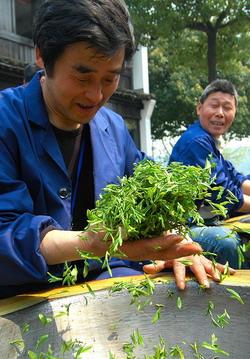
Contestants take part in a Longjing tea parching competition in Hangzhou, Zhejiang province.[China Daily]
SHANGHAI: Long the favorite drink for generations of Chinese, Longjing tea enjoys an unrivalled reputation for quality and flavor.Yet imitators and unlicensed producers have been muddying the market, watering down the quality and reputation of what is ranked the country's No 1 tea.
Now a new regulation is in force to ensure only genuine Longjing tea - mostly grown on the hillsides in the scenic areas around the West Lake of Hangzhou, capital of Zhejiang province - finds its way into the nation's teacups.
"It will take some time before the system is fully implemented. Hopefully, we can gradually restore the geographic exclusivity of Longjing tea within the year," said Lu Debiao, an official at the Zhejiang agriculture bureau.
The Zhejiang government has decreed that no tea merchant is allowed to label its product with the Longjing trademark without permission from provincial authorities. Offenders face serious legal consequences, it warned.
Highly prized in the market, Longjing tea has many imitators. At one time, more than 50 cities and counties in the country claimed to produce "Longjing" tea.
"Those so-called 'Longjing' teas largely came from Yunnan, Guizhou and Anhui provinces," said Zhu Liguo, deputy director of the provincial trademark division. "Basically this fake tea is gathered from farmers scattered around our province and is, of course, of relatively low quality."
Being No 1 on the Top 10 list of famous teas in China, Longjing enjoys a history of more than 1,000 years. Well known for its strong aroma and sweet flavor, it is frequently given as gifts to visiting heads of state.
"Longjing tea of higher quality certainly tastes better. But for ordinary consumers, the difference would be too subtle. That's why stricter regulation is needed," Zhu added.
Other than Longjing tea growers and processors, tea merchants and other operators in the retail chain can also apply for the labeling license. So far, more than 160 tea enterprises have been authorized by the Zhejiang provincial government to use the Longjing trademark in their products. Most of these enterprises are based in the major tea production areas in the West Lake region and neighboring Huzhou and Qiantang.
Lu said "an identification system" will be extensively implemented this year, meaning only Longjing teas produced in 18 specified cities and counties in the province are genuine.
"But we have no intention of excluding other qualified applicants from outside the specified regions. For example, if a Shanghai-registered company has been steadily providing high-quality Longjing tea to the market, it is also eligible to apply for certification," added Lu.





